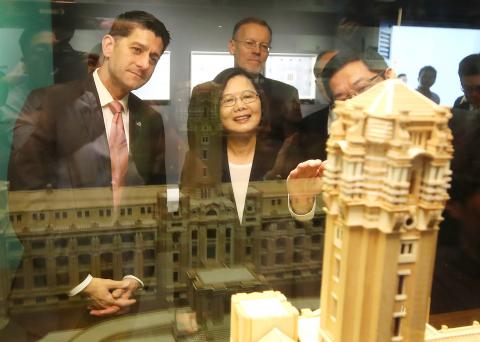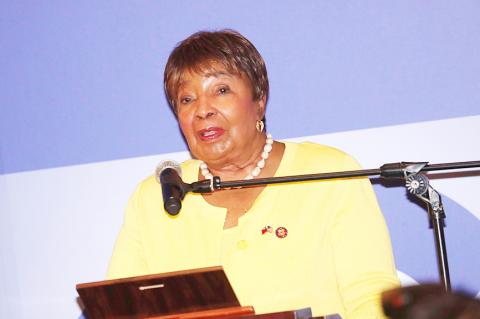The rest of the world should be more like Taiwan, former US House of Representatives speaker Paul Ryan said yesterday at an event at the American Institute in Taiwan’s (AIT) new facility in Taipei’s Neihu District (內湖) to mark 40 years of friendship between Taiwan and the US.
Ryan made the remarks at an afternoon banquet at the AIT compound, which is to officially open on May 6.
The US’ Taiwan Relations Act (TRA), enacted in 1979, was a rarity, as it had “absolute consensus” in Washington, he said.

PHOTO: CNA
“It is this deep, abiding friendship and bipartisanship that is a testament to the enduring friendship between our two countries,” Ryan said, adding that the anniversary of the passage of the TRA serves as a “picture-perfect display” of a wonderful foreign-policy achievement between Taipei and Washington.
The US could not ask for a better friend than Taiwan in its endeavor to carry out a strategy to ensure that freedom and openness flourish in the Indo-Pacific region, said Ryan, who served as House speaker from October 2015 to January.
What the US wants for the Indo-Pacific region is for it to be free, open, prosperous and innovative, and for the rest of the world to partner with the US in solving global problems, he said.

Photo: CNA
“In other words, we want the rest of the world to be more like Taiwan,” he said. “Taiwan actively uses its own experiences not only to help others, but to help others help themselves.”
“The world desperately needs more of Taiwan’s brand of leadership,” he said.
To celebrate the anniversary of the AIT’s establishment and the TRA’s enactment, AIT Director Brent Christensen said a special message of Taiwan-US friendship would be displayed on Taipei 101 to mark the milestone.
The message features a handshake symbolizing Taiwan-US ties and the display was to begin last night and would be shown for two more evenings, the AIT said.
AIT Chairman James Moriarty said in a speech that further progress across the many dimensions of the Taiwan-US partnership can be expected this year, including in the area of expanding people-to-people ties.
“In this regard, we welcome and look forward to exploring Taiwan’s interest in establishing preclearance operations at [Taiwan] Taoyuan International Airport,” Moriarty said.
According to US Customs and Border Protection, preclearance operations would allow US customs personnel to inspect travelers prior to boarding US-bound flights.
The US currently has 15 preclearance officials in six countries.
There is no firm timetable for the establishment of preclearance operations in Taiwan, as the process still requires more dialogue between the two sides, Moriarty told reporters after the opening ceremony at the banquet.
President Tsai Ing-wen (蔡英文) said that in today’s inter-connected world, it is vital that like-minded people move easily beyond their own borders.
“So we are ready, willing and able to work on including Taiwan in the US preclearance program to bring our people closer together,” Tsai said.
US Representative Eddie Bernice Johnson presented Tsai with a framed copy of a congratulatory resolution passed by the US Congress as part of Washington’s celebrations of the anniversary of the TRA’s implementation.
The event was also attended by Minister of Foreign Affairs Joseph Wu (吳釗燮), Taiwan Representative to the US Stanley Kao (高碩泰), Minister of National Defense Yen De-fa (嚴德發) and former president Ma Ying-jeou (馬英九), among others.

CHAOS: Iranians took to the streets playing celebratory music after reports of Khamenei’s death on Saturday, while mourners also gathered in Tehran yesterday Iranian Supreme Leader Ayatollah Ali Khamenei was killed in a major attack on Iran launched by Israel and the US, throwing the future of the Islamic republic into doubt and raising the risk of regional instability. Iranian state television and the state-run IRNA news agency announced the 86-year-old’s death early yesterday. US President Donald Trump said it gave Iranians their “greatest chance” to “take back” their country. The announcements came after a joint US and Israeli aerial bombardment that targeted Iranian military and governmental sites. Trump said the “heavy and pinpoint bombing” would continue through the week or as long

TRUST: The KMT said it respected the US’ timing and considerations, and hoped it would continue to honor its commitments to helping Taiwan bolster its defenses and deterrence US President Donald Trump is delaying a multibillion-dollar arms sale to Taiwan to ensure his visit to Beijing is successful, a New York Times report said. The weapons sales package has stalled in the US Department of State, the report said, citing US officials it did not identify. The White House has told agencies not to push forward ahead of Trump’s meeting with Chinese President Xi Jinping (習近平), it said. The two last month held a phone call to discuss trade and geopolitical flashpoints ahead of the summit. Xi raised the Taiwan issue and urged the US to handle arms sales to

BIG SPENDERS: Foreign investors bought the most Taiwan equities since 2005, signaling confidence that an AI boom would continue to benefit chipmakers Taiwan Semiconductor Manufacturing Co’s (TSMC, 台積電) market capitalization swelled to US$2 trillion for the first time following a 4.25 percent rally in its American depositary receipts (ADR) overnight, putting the world’s biggest contract chipmaker sixth on the list of the world’s biggest companies by market capitalization, just behind Amazon.com Inc. The site CompaniesMarketcap.com ranked TSMC ahead of Saudi Aramco and Meta Platforms Inc. The Taiwanese company’s ADRs on Tuesday surged to US$385.75 on the New York Stock Exchange, as strong demand for artificial intelligence (AI) applications led to chip supply constraints and boost revenue growth to record-breaking levels. Each TSMC ADR represents

State-run CPC Corp, Taiwan (CPC, 台灣中油) yesterday said that it had confirmed on Saturday night with its liquefied natural gas (LNG) and crude oil suppliers that shipments are proceeding as scheduled and that domestic supplies remain unaffected. The CPC yesterday announced the gasoline and diesel prices will rise by NT$0.2 and NT$0.4 per liter, respectively, starting Monday, citing Middle East tensions and blizzards in the eastern United States. CPC also iterated it has been reducing the proportion of crude oil imports from the Middle East and diversifying its supply sources in the past few years in response to geopolitical risks, expanding